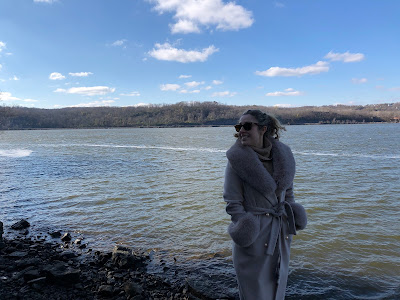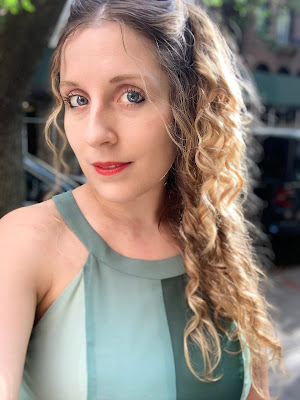Welcome back to the Secret Victorianst for a different sort of blog today—an interview with fellow historical novelist, Hope C. Tarr. You might remember Hope from the virtual panel event I did with Lady Jane’s Salon, the NYC-based romance readers’ club she co-founded, back in 2020. Next month, Hope’s debut historical novel Irish Eyes will be released by Lume Books, and I know readers of the Secret Victorianist are going to love it. Irish Eyes opens on the Aran Islands in 1898 and takes readers on a journey, with its heroine Rose, to the streets of late nineteenth/early twentieth-century New York City. I hope you enjoy my conversation with Hope and enter for a chance to win a copy of her novel below!
SV: How did you first get the idea for your novel, Irish Eyes?
Hope: Irish Eyes is very much a love note to my Irish ancestors, who came to America on the coffin ships at the height of the Great Hunger. For years, I batted around the idea of writing something with an Irish heroine. Finally, on a hiking trip to Western Ireland in (gulp) 2008, I stopped at the famed Cliffs of Moher and gazed across Galway Bay to the trio of islands known as the Arans, and Rose O'Neill’s story began taking shape in my mind. Back in Manhattan, running along the Hudson River, looking out to Ellis Island and Lady Liberty helped further flesh out Rose’s story.
SV: How did the book evolve from your first to your final draft?
Hope: Whoever first said that “writing is in the rewriting” was wise indeed. Irish Eyes changed so many times. Originally, I had a prologue, in fact two prologues, which I really loved. The first prologue began with Rose in 1922 at mass narrating her life story to the parish priest. The second prologue started with Adam, Rose's future love interest, at the Battle of San Juan Heights during the Spanish-American War. I've actually shared that prologue on my History With Hope Substack! To pick up the pacing and start in the thick of the story, both of these very different prologues ended up on the chopping block. A la Stephen King, sometimes you really do have to murder your darlings. 😉
But by far the biggest shift in molding the story was also the scariest. At the onset, I'd written the entire book in my trusty go-to perspective: third-person. But something was missing. The story wasn't... gelling. As a reader, I'd always adored novels written in the first-person—du Maurier’s Rebecca, anyone? —but I'd never had the courage to try first-person POV myself. Once I did and rewrote the entire book in Rose's voice, it all began coming together.
SV: How did writing historical fiction differ from the genres you've written in in the past?
Hope: After wonderful years spent writing 20+ romances for Penguin, Harlequin, and Macmillan, I was ready for a BIG change. Ready to push the boundaries of genre and do a deep dive into history, in this case, mostly early twentieth-century history. Ready to write the sort of big, sweeping historical novel that I'd grown up devouring. Books like Diana Gabaldon's Outlander series, technically romance, where you get to spend time with the characters, who evolve over not days/weeks/months but years. In other words, a saga. For a while now, “saga” has been something of a dirty word in American publishing. For that reason, I suspected I was going to have a tough time selling this book, especially as it would be my historical fiction debut, which probably explains why it took me so long to finish it and then shape it into a shoppable manuscript. That being said, if I had to sum up the experience of writing Irish Eyes and bringing it to this point, that word would be “freeing.”
SV: Do you have any tips for writers of historical fiction who are trying to make their books relatable to modern readers without being anachronistic?
Hope: Admittedly, this can be a tough balance to strike, especially when keeping in mind younger readers, who approach fiction with a very different set of expectations than I did at that age. With Irish Eyes, as with any historical fiction, I try to step back and ask myself, “how critical is this point/word/phrase to telling a great story?” If the answer is “not so much,” I may leave it out rather than veer into anachronism. But I also think it's important to understand how we've collectively evolved over the eras. And not evolved. So many of the issues addressed in Irish Eyes—immigration, the roles and rights of women, labor reform, income inequality—are eerily reflective of our present moment. History is cyclical, not linear. It's important to bear in mind that we are making "history" every waking moment.
SV: Your novel, while it's one woman's story, touches on major world and local events, e.g., WWI and the Triangle Shirtwaist Factory fire. What was your process like for naturally weaving these references into the novel?
Hope: The biggest challenge in writing Irish Eyes was to decide what historical events not to include. (Back to murdering those darlings!). The book covers 24 years in Rose's life. While the 24/7 news cycle is a recent phenomenon, newspapers were a big, busy feature of turn-of-the-century life. In writing the novel, I put in, and later took out, several events that, while interesting, wouldn't have directly impacted the immigrant community of my fictional heroine and her growing family. For example, the assassination of President McKinley (September 14, 1901) gets a brief mention while the Triangle Shirtwaist Factory Fire of March 25, 1911, in Lower Manhattan, gets a half-chapter.
SV: You're a New Yorker yourself. How did this help your process in writing the book?
Hope: Living here as I've been privileged to do, the city's history is all around, waiting to reveal its stories to those open to knowing them. I was here in 2011 for the centennial commemoration of the Triangle Shirtwaist Factory Fire at the Brown Building (formerly the Asch Building) where the factory was housed in 1911. The long-anticipated memorial was dedicated in October 2023. The adjacent Washington Square Park began as a potter's field when a series of yellow fever outbreaks starting in 1797 caused the city morgues to overflow. Human remains still rest beneath the elegant fountain and curated plantings. McSorley's Old Alehouse, NYC's oldest continuously operating bar (1854-present), which I recently revisited for another History With Hope episode, serves the same cheddar cheese and onion platters it did back when the great illusionist Houdini stopped in for a post-performance pint.
SV: What historical novels have you read and loved recently?
Hope: I'm very keen on World War II at the moment, likely because I'm working on the sequel to Irish Eyes, set in occupied Paris. I recently finished, and loved, Good Night From Paris, by Jane Healey, a fictional account of the real-life Hollywood screen actress, Drue Leyton, who was living in Paris with her French husband when the Second World War broke out. Rather than return home to the States, Drue accepted a position broadcasting from Paris to the (then neutral) US. Under the Nazi occupation, she repeatedly risked her life working for the Resistance.
SV: What should we look forward to seeing later in the American Songbook Series?
Hope: As I cagily slipped in above, I'm at work on a sequel, Stardust! The second book in my American Songbook series, Stardust follows Rose's granddaughter, Daisy, into the late 1930s and 1940s. Fashioned in the image of her indomitable Irish grandmother, Daisy will take the reins of Rose's Kavanaugh's Department Store when the time comes. In preparation, Rose sends Daisy to Paris to apprentice with the iconic couturier and fragrance entrepreneur, Coco Chanel. In shadowing the mercurial Chanel, Daisy is thrown into the thick of a glittering and treacherous cast of characters—American and British expats, the Parisian haute-monde, war correspondents, and German spies—all of whom congregate at the Hotel Ritz. While she's there, the Nazis invade and occupy Paris. Like the world-famous Chanel No. 5, a blend of 80 secret ingredients, no one in occupied Paris is what they at first seem. 😉
 |
| Hope C. Tarr |
SV: Thank you so much for speaking with me, Hope, and for giving me the chance to read Irish Eyes ahead of publication.
Hope: Thank you so much for having me! I hope readers will enjoy Irish Eyes as much as I loved writing it.
Would you like to win a signed paperback copy of Hope C. Tarr’s Irish Eyes, alongside a signed paperback of my own historical novel, Bronte’s Mistress? If so, sign up to my monthly email newsletter here. Anyone who subscribes to the newsletter between 21st November 2023 and 7th December 2023 (the Irish Eyes release day!) will be entered into a random draw to win both books. Already signed up? Spread the word to friends and family who might want to win and stay in touch with me via Facebook, Instagram, and Twitter.
























